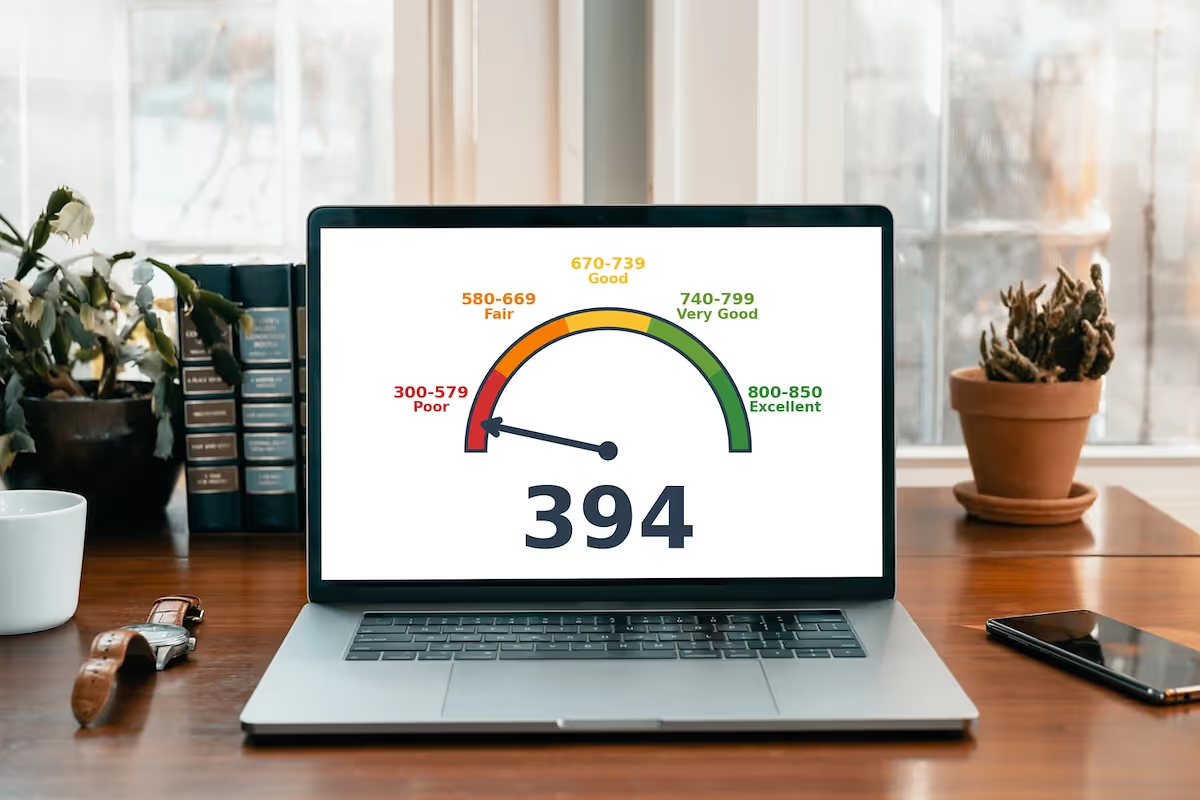
Kudos has partnered with CardRatings and Red Ventures for our coverage of credit card products. Kudos, CardRatings, and Red Ventures may receive a commission from card issuers. Kudos may receive commission from card issuers. Some of the card offers that appear on Kudos are from advertisers and may impact how and where card products appear on the site. Kudos tries to include as many card companies and offers as we are aware of, including offers from issuers that don't pay us, but we may not cover all card companies or all available card offers. You don't have to use our links, but we're grateful when you do!
394 Credit score: What You Need to Know in 2025
July 1, 2025


TL;DR
A 394 credit score provides a clear opportunity for improvement. According to the FICO model, this score falls into the "Poor" credit score category, giving you a solid baseline to build from.
What Does a 394 Credit Score Mean?
A credit score of 394 falls into the "poor" credit range on the 300-850 FICO scale. Lenders see this score as a sign of high risk, creating significant financial roadblocks. You'll likely face difficulty getting approved for credit cards, mortgages, or auto loans. Any credit you do secure will probably come with very high interest rates and unfavorable terms, making borrowing much more expensive.
While a 394 score is a major hurdle, it's not a permanent state. Consider it the starting point for rebuilding your financial health. Recognizing the challenge is the essential first step on the journey toward a better credit profile. With consistent effort, improving your score and unlocking better financial products in the future is an achievable goal.
Who Has a 394 Credit Score?
A 394 credit score is well below the national average for any age demographic. In fact, data shows that credit scores tend to improve steadily with age. Here is the generational breakdown of average FICO scores from 2023:
- Generation Z (ages 18-26): 680
- Millennials (ages 27-42): 690
- Generation X (ages 43-58): 709
- Baby Boomers (ages 59-77): 745
- Silent Generation (ages 78+): 760
Credit Cards With a 394 Credit Score
A credit score of 394 falls into the "very poor" range, which can significantly hinder your ability to qualify for most traditional credit cards. Lenders generally view applicants with scores this low as high-risk, leading to a high likelihood of rejection for standard unsecured cards. Your options will likely be restricted to products specifically designed for building credit, such as secured credit cards, which require a cash deposit as collateral.
Kudos offers an AI-powered tool that analyzes your preferences to recommend suitable cards from its database of nearly 3,000 options. This personalized process helps you identify products designed for building credit that align with your specific financial situation, even with a challenging score.
Auto Loans and a 394 Credit Score
A 394 credit score places you in the deep subprime category, making it challenging to secure an auto loan. While approval may still be possible, you can expect to face extremely high interest rates and less favorable loan terms from lenders.
Based on data from a 2025 guide on interest rates, here is how the average rates break down across different credit score tiers:
- Super-prime (781-850): 5.25% for new cars, 7.13% for used cars
- Prime (661-780): 6.87% for new cars, 9.36% for used cars
- Non-prime (601-660): 9.83% for new cars, 13.92% for used cars
- Subprime (501-600): 13.18% for new cars, 18.86% for used cars
- Deep subprime (300-500): 15.77% for new cars, 21.55% for used cars
Mortgages at a 394 Credit Score
A 394 credit score is unfortunately well below the minimum threshold for any standard home loan. According to current mortgage requirements, even the most accessible government-backed programs have higher cutoffs. For instance, FHA loans require a minimum score of 500. While some risky alternatives like owner financing may exist, you will not qualify for a traditional mortgage from a legitimate lender.
Even if you could find a subprime lender, a low score dramatically impacts loan terms. You would face significantly higher interest rates, making your loan far more expensive over its lifetime. Lenders would also likely limit the amount you could borrow, reducing your purchasing power, and would subject your entire financial profile to an intensive review process known as manual underwriting.
What's in a Credit Score?
Figuring out what goes into your credit score can feel like trying to solve a complex puzzle, but it's primarily based on a handful of key financial habits. The most common factors include:
- Your payment history tracks whether you have paid past credit accounts on time.
- Credit utilization is the percentage of your available credit that you are currently using.
- The length of your credit history considers the age of your oldest account and the average age of all your accounts.
- Having a healthy mix of credit types, such as credit cards and installment loans, can positively impact your score.
- Recent credit inquiries and newly opened accounts can temporarily lower your score.
How to Improve Your 394 Credit Score
While a 394 credit score indicates significant financial challenges, it is entirely possible to rebuild your credit with the right strategy and consistent effort. With a dedicated approach, you can see meaningful improvements in as little as three to six months. Here are four actions you can take to start raising your score:
- Apply for a secured credit card. Because they require a cash deposit that serves as your credit line, these cards are accessible even with a very low score. Your on-time payments are reported to the credit bureaus, allowing you to build a positive payment history from the ground up.
- Become an authorized user. Ask a trusted friend or family member with a strong credit history to add you as an authorized user on one of their credit cards. This allows you to benefit from their long history of on-time payments and low credit utilization, which can give your score a helpful boost.
- Consider a credit-builder loan. These small loans are designed specifically to help people establish or rebuild credit. As you make regular on-time payments, the lender reports this positive activity to the credit bureaus, directly impacting the most significant factor in your score.
- Monitor your credit reports. Regularly check your free credit reports for any errors or inaccuracies that could be dragging your score down. Disputing and removing incorrect negative items is one of the quickest ways to potentially improve your credit score.
Using a tool like the Kudos browser extension can help you monitor your score and manage your cards as you work to improve your credit.
Unlock your extra benefits when you become a Kudos member

Turn your online shopping into even more rewards

Join over 400,000 members simplifying their finances

Editorial Disclosure: Opinions expressed here are those of Kudos alone, not those of any bank, credit card issuer, hotel, airline, or other entity. This content has not been reviewed, approved or otherwise endorsed by any of the entities included within the post.



































.webp)


.webp)

.webp)



